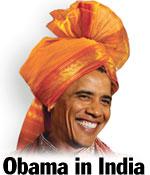 In a significant announcement during United States President Barack Obama's visit, the US on Saturday said it will support India's full membership in the 45-member Nuclear Suppliers Group and three other multilateral export control regimes.
In a significant announcement during United States President Barack Obama's visit, the US on Saturday said it will support India's full membership in the 45-member Nuclear Suppliers Group and three other multilateral export control regimes.
The US support to India in the four multilateral export control regimes will make it easier for India to get dual-use technology from member countries though it is subject to rules of individual nations. "These are the NSG -- what is called Missile Technology Control Regime -- the Missile Technology Control Regime, the Australian Group and the Wassanaar Arrangement," Mike Froman, deputy national security advisor for international economic affairs, said in a statement.
It will also provide India with a say in framing export control rules. The indication of America's move came in Obama's speech to the business community at the Hotel Trident in Mumbai where he spoke about his plans to reform export controls. These are groups of multilateral, dual use export control clubs.
The Australia Group deals with chemical and biological weapons, and Wassenaar deals with conventional weapons and dual use technology in it. "Now, this membership will come in a phased manner. And we will consult with our regime members to encourage the evolution of a membership criteria of these regimes consistent with maintaining their core principles. So as the membership criteria of these four regimes evolves, we intend to support India's full membership in them. And at the same time, India will take steps to fully adopt the regime's export control requirements to reflect its prospective membership," Forman said.
Three Indian entities -- Defence Research and Development Organisation, Indian Space Research and the Hyderabad-headquartered Bharat Dynamics Limited (BDL) -- will be taken off embargoed list. "The second element of the export control reform package being announced is that we will remove India's defense and space-related entities from the US entity list. The entity list at one point had, I believe, 220 Indian entities on it. And there are only four left. And today we will be announcing a removal of three of them," the US statement said.
"And now removing these entities from the entity list will allow for greater trade and cooperation in civilian space and defence, and enable our governments to focus on other outstanding barriers that hinder expanded bilateral high-tech trade. And this a very significant step forward," the statement added.





